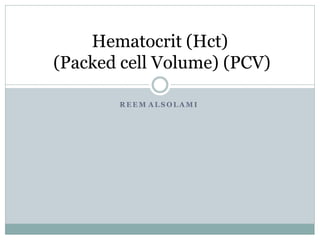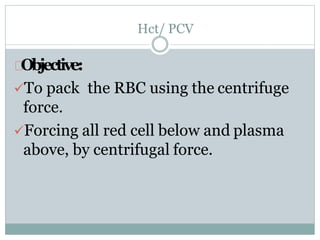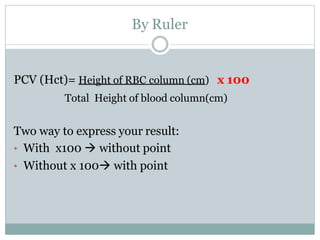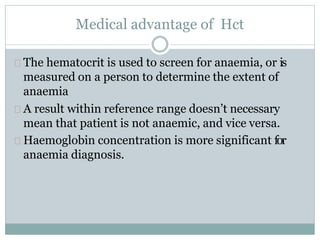Lab+3 convertido
- 1. R E E M A L S OL A MI Hematocrit (Hct) (Packed cell Volume) (PCV)
- 2. Hct/ PCV Objective: To pack the RBC using the centrifuge force. Forcing all red cell below and plasma above, by centrifugal force.
- 3. Defenition of Hct The percentage by volume of packed red blood cells in a given sample of blood after centrifugation
- 4. Purpose for doing the Hct Blood is made up of red and white blood cells, and plasma. A decrease in the number or size of red cells also decreases the amount of space they occupy, resulting in a lower hematocrit. An increase in the number or size of red cells increases the amount of space they occupy, resulting in a higher hematocrit.
- 5. Procedure 1. Capillary tube is used
- 6. 2. The capillary is filled with blood to half of the tube , but not filled too much
- 7. 3. Sealing the capillary with clay (cement)
- 8. 4. Centrifugation (10000 rpm ad two minute)
- 9. 5. Reading the Hct
- 10. By Ruler PCV (Hct)= Height of RBC column (cm) x 100 Total Height of blood column(cm) Two way to express your result: • With x100  without point • Without x 100 with point
- 11. Result Female 0.36-0.46 Male 0.40-0.54 At birth 0.44-0.54 2-12 0.34-0.45 If multiplied by 100 e.g. 36-46
- 12. Factors affecting the Hct 1. Speed of centrifuge Ideal speed approximately 10000 rpm for two minutes. • Higher than ideal speed ( rpm)-leads to Insufficient packing Falsely Higher volume of RBC Falsely Lower Hct • Lower than ideal speed ( rpm)--leads to Lysis of RBC--  Lower RBc volume  Falsely higher Hct
- 13. 2.Time of centrifugation • Under centrifugation: Time insufficient packing of RBC  Falsely higher Hct. Over centrifugatiuon: Time  RBC lysis- Falsely lower Hct.
- 14. 3. Proper sealing • Improper sealing: 1Big hole-- leaking of whole blood and empty the capillary while centrifuged. 2Very small hole (unseen by eye)--causes small leak that only affects the RBC volume because it closer to the sealing-- falsely low RBC volume- low Hct.
- 15. 4. Biological factors • Trapped plasma 1. In normal condition: • There is a small per cent of plasma which is trapped with the packed RBC, approximately 2-3%. • E.g. 43 is actually 40 by considering the 3% of plasma , but it is always be ignored as it is negligible.
- 16. 2. In pathological condition: • The per cent of trapped plasma may increased , reaching to 10% , and thus leads to high RBC volume and ultimately leads to high Hct.
- 17. Medical advantage of Hct The hematocrit is used to screen for anaemia, or is measured on a person to determine the extent of anaemia A result within reference range doesn’t necessary mean that patient is not anaemic, and vice versa. Haemoglobin concentration is more significant for anaemia diagnosis.
- 18. Important Reminders Some students didn’t wright their name and no reported result for them. Always write your name in the upper left corner With the number of lab under it Please always use proper A4 size paper and not a notebook. No one will be signed for attendance except after I see her clean place in the lab, unclean bench will reduce your mark.


















